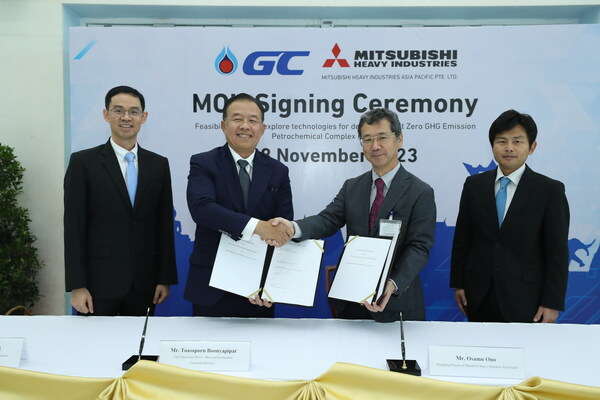PTT Global Chemical Public Company Limited (GC) has joined forces with Mitsubishi Heavy Industries Asia Pacific (MHI-AP) to explore technologies that could pave the way for a large-scale carbon-neutral petrochemical complex.
The Memorandum of Understanding (MOU) signed between the two entities outlines a four-year collaboration to study and implement innovative solutions, focusing on low-carbon fuels like hydrogen and ammonia, alongside Carbon Capture and Storage (CCS) technologies.
The collaboration’s primary objectives are twofold. First, to evaluate the feasibility of incorporating hydrogen and ammonia as fuels for gas turbines, coupled with CCS technologies to curtail carbon dioxide emissions from power generators. Second, to assess the optimal application and enhancement of CCS technologies for the Steam-Methane Reforming (SMR) process, a crucial step in petrochemical production. MHI-AP brings its expertise to the table, providing essential technologies such as carbon capture, hydrogen combustion gas turbines, and ammonia gas turbines.
This partnership is in harmony with Thailand’s ambitious goal of achieving carbon neutrality by 2050. It reflects GC’s commitment to sustainable business growth and reducing greenhouse gas emissions by 20% by 2030, ultimately striving for net-zero greenhouse gas emissions by 2050. The initiative falls under GC’s overarching business strategy known as ‘3 Steps Plus,’ emphasizing a step change to enhance competitiveness, stepping out to explore growth opportunities, and stepping up for sustainable practices.
This collaboration is not just a localized effort but part of a broader global initiative involving prominent firms. The goal is to foster an environmentally friendly industry, emphasizing the pivotal role that technology and innovation play in steering traditional sectors towards sustainability.
As the petrochemical landscape undergoes a transformative shift, the alliance between PTT Global Chemical and Mitsubishi stands as a testament to the industry’s commitment to a greener and more sustainable future.





